70 - On Love克里希那穆提英文著作
克里希那穆提书阅读顺序

克里希那穆提书阅读顺序克里希那穆提(Jiddu Krishnamurti)是一位印度哲学家和思想家,他的著作涉及哲学、心理学、教育和社会议题等领域。
以下是克里希那穆提的一些主要著作,您可以按照以下顺序阅读:《寻找真相》(The Search for Truth)这本书是克里希那穆提的早期作品,主要探讨了个人如何找到真理和内在的平静。
克里希那穆提在这本书中探讨了人类面临的一些基本问题,例如生死、自由、爱和孤独等,并提供了一些深刻的思考和解决方法。
《人生核能》(The Power of the Atom)这本书是克里希那穆提在1955年的一次演讲中提出的,主要探讨了个人如何释放内在的能量,并通过自我教育和自我发现来追求真理和内在的平静。
《自由的智慧》(The Wisdom of Freedom)这本书是克里希那穆提在1957年的一次演讲中提出的,主要探讨了自由的概念和人类如何追求真正的自由。
克里希那穆提认为,真正的自由不是外在的限制,而是内在的自由,需要通过自我发现和自我超越来实现。
《内心的平静》(The Inner Triad)这本书是克里希那穆提在1962年的一次演讲中提出的,主要探讨了内心平静的概念和人类如何实现内心的平静。
克里希那穆提认为,内心的平静需要通过对自己的认知和理解来实现,而不是通过外在的追求或抑制。
《人类需要什么》(What the World Needs Now)这本书是克里希那穆提在1964年的一次演讲中提出的,主要探讨了人类需要什么才能实现真正的和平和幸福。
克里希那穆提认为,人类需要超越自我和欲望的限制,通过自我发现和自我超越来实现真正的内在成长和幸福。
《生命的发现》(The Discovery of Life)这本书是克里希那穆提在1967年的一次演讲中提出的,主要探讨了生命的本质和意义。
克里希那穆提认为,生命是一种不断的发现和探索过程,需要通过对自己的认知和理解来实现真正的内在成长和发展。
与Kata先生谈克 克里希那穆提
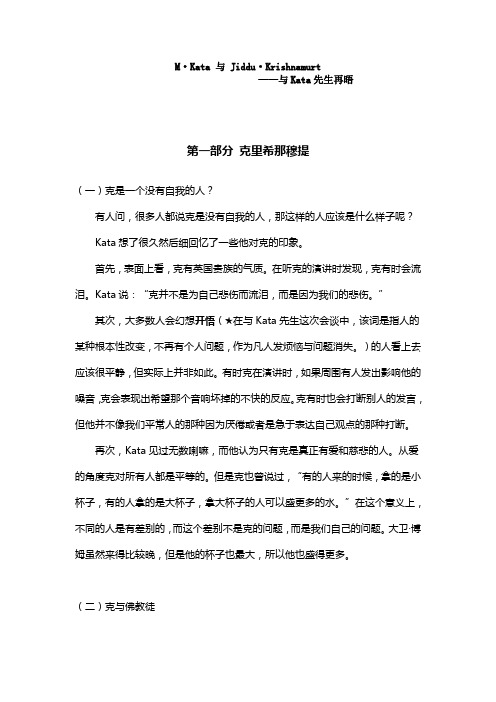
M·Kata 与Jiddu·Krishnamurt——与Kata先生再晤第一部分克里希那穆提(一)克是一个没有自我的人?有人问,很多人都说克是没有自我的人,那这样的人应该是什么样子呢?Kata想了很久然后细回忆了一些他对克的印象。
首先,表面上看,克有英国贵族的气质。
在听克的演讲时发现,克有时会流泪。
Kata说:“克并不是为自己悲伤而流泪,而是因为我们的悲伤。
”其次,大多数人会幻想开悟(★在与Kata先生这次会谈中,该词是指人的某种根本性改变,不再有个人问题,作为凡人发烦恼与问题消失。
)的人看上去应该很平静,但实际上并非如此。
有时克在演讲时,如果周围有人发出影响他的噪音,克会表现出希望那个音响坏掉的不快的反应。
克有时也会打断别人的发言,但他并不像我们平常人的那种因为厌倦或者是急于表达自己观点的那种打断。
再次,Kata见过无数喇嘛,而他认为只有克是真正有爱和慈悲的人。
从爱的角度克对所有人都是平等的。
但是克也曾说过,“有的人来的时候,拿的是小杯子,有的人拿的是大杯子,拿大杯子的人可以盛更多的水。
”在这个意义上,不同的人是有差别的,而这个差别不是克的问题,而是我们自己的问题。
大卫〃博姆虽然来得比较晚,但是他的杯子也最大,所以他也盛得更多。
(二)克与佛教徒有朋友提出疑问,在普普尔的克传中有一段记载,克在世时,对佛教弟子有某种特殊的感情。
根据Kata先生多次与克接触,他如何来看待呢?Kata说,应该是这样。
紧接着,Kata先生讲了一个例子:有一个相当著名的佛教人士和克对完话之后,那个人好象还想找些话说,想说说有关他自己或者有关克,克当时说,我不想听了,然后克就离开。
Kata先生认为,普通意义上讲,克对佛教有其自己的感情。
但作为读者的我们,不能将其“泛化”和“误解”为克是赞同佛教中的某些东西,而克是反对传统宗教和教条的。
第二部分再谈Kata对克的理解(一)对“探索真理”的探讨一个朋友说他曾私下问起Kata,人们试图探索和寻找真理,包括那些“真诚用心”的宗教人士,这种“探索和寻找真理”,是不是也是一种更深的执着呢?Kata说,首先,他不认为有多少人对此真正有兴趣,对真理有兴趣的人很罕见;其次,即使那些很少的“对真理有兴趣的人”中,大部分其实是对自己有兴趣,对自己在此过程中的“成功”和“满意”有兴趣,而不是真理本身。
克里希那穆提《超越时空》
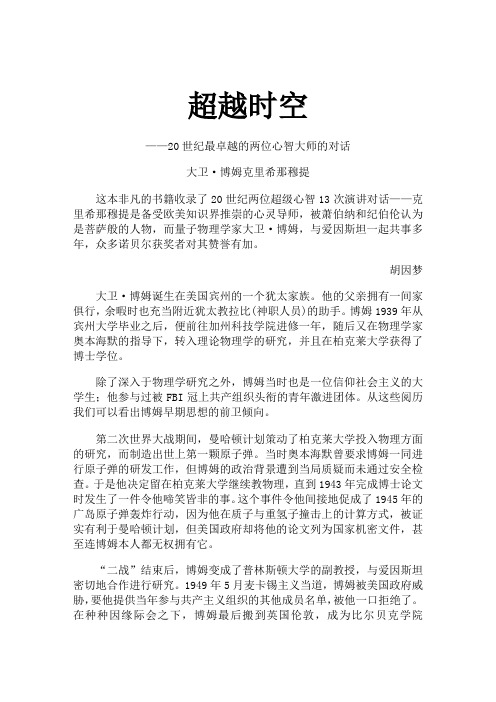
超越时空——20世纪最卓越的两位心智大师的对话大卫·博姆克里希那穆提这本非凡的书籍收录了20世纪两位超级心智13次演讲对话——克里希那穆提是备受欧美知识界推崇的心灵导师,被萧伯纳和纪伯伦认为是菩萨般的人物,而量子物理学家大卫·博姆,与爱因斯坦一起共事多年,众多诺贝尔获奖者对其赞誉有加。
胡因梦大卫·博姆诞生在美国宾州的一个犹太家族。
他的父亲拥有一间家俱行,余暇时也充当附近犹太教拉比(神职人员)的助手。
博姆1939年从宾州大学毕业之后,便前往加州科技学院进修一年,随后又在物理学家奥本海默的指导下,转入理论物理学的研究,并且在柏克莱大学获得了博士学位。
除了深入于物理学研究之外,博姆当时也是一位信仰社会主义的大学生;他参与过被FBI冠上共产组织头衔的青年激进团体。
从这些阅历我们可以看出博姆早期思想的前卫倾向。
第二次世界大战期间,曼哈顿计划策动了柏克莱大学投入物理方面的研究,而制造出世上第一颗原子弹。
当时奥本海默曾要求博姆一同进行原子弹的研发工作,但博姆的政治背景遭到当局质疑而未通过安全检查。
于是他决定留在柏克莱大学继续教物理,直到1943年完成博士论文时发生了一件令他啼笑皆非的事。
这个事件令他间接地促成了1945年的广岛原子弹轰炸行动,因为他在质子与重氢子撞击上的计算方式,被证实有利于曼哈顿计划,但美国政府却将他的论文列为国家机密文件,甚至连博姆本人都无权拥有它。
“二战”结束后,博姆变成了普林斯顿大学的副教授,与爱因斯坦密切地合作进行研究。
1949年5月麦卡锡主义当道,博姆被美国政府威胁,要他提供当年参与共产主义组织的其他成员名单,被他一口拒绝了。
在种种因缘际会之下,博姆最后搬到英国伦敦,成为比尔贝克学院(Birkbeck College)的理论物理教授。
1959年,博姆的妻子莎拉向他推荐了在英国图书馆里发现的一本书,作者就是克里希那穆提(J·Krishnamurti)。
克里希那穆提《教育就是解放心灵》
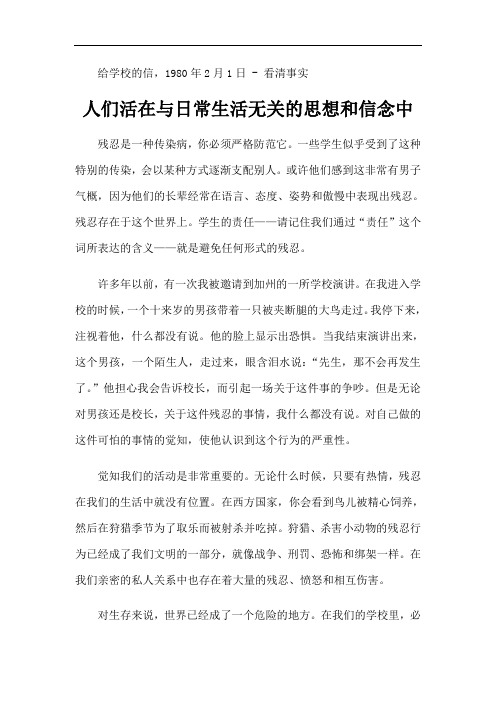
给学校的信,1980年2月1日 - 看清事实人们活在与日常生活无关的思想和信念中残忍是一种传染病,你必须严格防范它。
一些学生似乎受到了这种特别的传染,会以某种方式逐渐支配别人。
或许他们感到这非常有男子气概,因为他们的长辈经常在语言、态度、姿势和傲慢中表现出残忍。
残忍存在于这个世界上。
学生的责任——请记住我们通过“责任”这个词所表达的含义——就是避免任何形式的残忍。
许多年以前,有一次我被邀请到加州的一所学校演讲。
在我进入学校的时候,一个十来岁的男孩带着一只被夹断腿的大鸟走过。
我停下来,注视着他,什么都没有说。
他的脸上显示出恐惧。
当我结束演讲出来,这个男孩,一个陌生人,走过来,眼含泪水说:“先生,那不会再发生了。
”他担心我会告诉校长,而引起一场关于这件事的争吵。
但是无论对男孩还是校长,关于这件残忍的事情,我什么都没有说。
对自己做的这件可怕的事情的觉知,使他认识到这个行为的严重性。
觉知我们的活动是非常重要的。
无论什么时候,只要有热情,残忍在我们的生活中就没有位置。
在西方国家,你会看到鸟儿被精心饲养,然后在狩猎季节为了取乐而被射杀并吃掉。
狩猎、杀害小动物的残忍行为已经成了我们文明的一部分,就像战争、刑罚、恐怖和绑架一样。
在我们亲密的私人关系中也存在着大量的残忍、愤怒和相互伤害。
对生存来说,世界已经成了一个危险的地方。
在我们的学校里,必须完全避免任何形式的强迫、恐吓、愤怒,因为所有这些都让心灵和头脑变得僵硬,而友爱和残忍是不能共存的。
任何形式的残忍不仅让你的心灵僵硬,而且会扭曲你的思考,你的行为。
你要知道,作为一个学生,认识到这一点是多么的重要。
头脑和心灵一样,是个精密的仪器,既敏感又有能力,当残忍和压迫碰触到它时,就会导致自我的僵化。
友爱、爱没有自我那样的中心。
那么,读过这些话,并且对它们有了相当的理解,你会做什么呢?你学习了前面说的东西,你正在领会这些话的内容。
那么你的行动是什么呢?你的回应不仅是学习和领会,还要行动。
印度哲学家:克里希那穆提人物简介

克里希那穆提著作的翻译和传播受到了广泛关注
• 他的著作被翻译成多种语言,使他的思想得到了更广泛的传播
• 他的著作对现代哲学、心理学和宗教研究产生了重要影响
05
克里希那穆提的人物评价与争议
克里希那穆提在印度的声誉与评价
Hale Waihona Puke 克里希那穆提在印度享有很高的声誉
克里希那穆提在印度的评价存在争议
• 他被认为是一位伟大的哲学家和心灵导师
• 克里希那穆提认为“自我”是一个幻觉,是人类痛苦的根源
克里希那穆提通过自己的经历和理解阐述了“无我”的观念
• 他认为自我是一个虚构的概念,是人类为了生存和安全感而创造的
• 摆脱自我,才能体验到真正的自由和安宁
克里希那穆提的“无我”观念对现代哲学产生了影响
• 促使人们反思自我和个体的存在,摆脱自我中心的思考方式
• 他的思想对现代宗教和文化的研究产生了启示
克里希那穆提的思想在当代社会仍然具有价值
• 他的思想可以帮助人们摆脱痛苦和困惑,寻求真正的自由和安宁
• 他的思想对现代哲学、心理学和宗教研究仍然具有重要的启示作用
谢谢观看
T H A N K Y O U F O R WATC H I N G
Docs
• 有些人对他的思想持怀疑态度,认为他的观点过于极端
• 他的思想对印度文化和社会产生了深远的影响
• 有些人则认为他的思想具有深刻的启示,对人生和心灵
有着重要的指导意义
克里希那穆提在国际上的评价与争议
克里希那穆提在国际上享有很高的声誉
克里希那穆提在国际上的评价存在争议
• 他被认为是一位重要的哲学家和心灵导师
• 对现代心理学和人类学的研究产生了启示
克里希那穆提的“觉知”理论
克里希那穆提经典语录,克里希那穆提名言名句
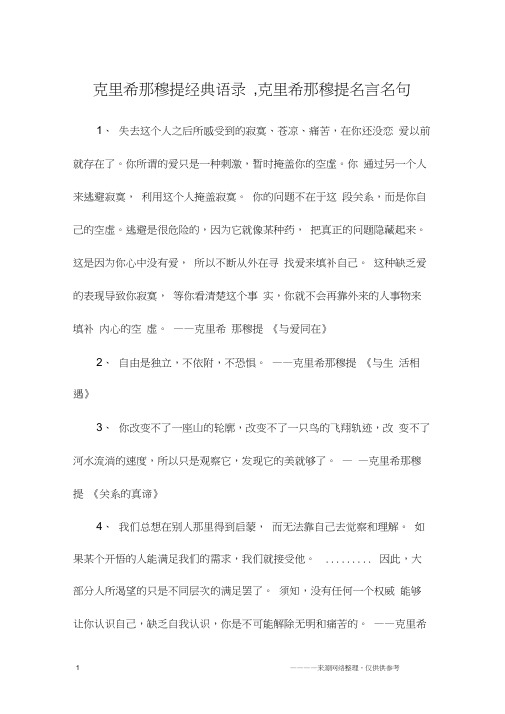
克里希那穆提经典语录,克里希那穆提名言名句1、失去这个人之后所感受到的寂寞、苍凉、痛苦,在你还没恋爱以前就存在了。
你所谓的爱只是一种刺激,暂时掩盖你的空虚。
你通过另一个人来逃避寂寞,利用这个人掩盖寂寞。
你的问题不在于这段关系,而是你自己的空虚。
逃避是很危险的,因为它就像某种药,把真正的问题隐藏起来。
这是因为你心中没有爱,所以不断从外在寻找爱来填补自己。
这种缺乏爱的表现导致你寂寞,等你看清楚这个事实,你就不会再靠外来的人事物来填补内心的空虚。
——克里希那穆提《与爱同在》2、自由是独立,不依附,不恐惧。
——克里希那穆提《与生活相遇》3、你改变不了一座山的轮廓,改变不了一只鸟的飞翔轨迹,改变不了河水流淌的速度,所以只是观察它,发现它的美就够了。
——克里希那穆提《关系的真谛》4、我们总想在别人那里得到启蒙,而无法靠自己去觉察和理解。
如果某个开悟的人能满足我们的需求,我们就接受他。
......... 因此,大部分人所渴望的只是不同层次的满足罢了。
须知,没有任何一个权威能够让你认识自己,缺乏自我认识,你是不可能解除无明和痛苦的。
——克里希1 ————来源网络整理,仅供供参考那穆提《生命之书》5、“有依赖,就不可能有爱。
”灵魂只能独行,因为我们都有能力决定自己的方向,却没有能力控制别人的道路。
如果偏要把别人拉到你的生活轨迹上,或者你又要强行的进入别人的世界,最终的结果无非只有两种,要么在自己的世界里等死,要么在别人的世界里被扯到四分五裂。
——克里希那穆《爱与寂寞》6、正是因为你内心没有爱所以你不停地从外面寻找爱来填满自己这种爱的缺乏就是你的孤独而当你看到这个真相你就再也不会试图用外在的人或事来填补了。
——克里希那穆提《与生活相遇》7、除非一个人觉悟出生活的意义,否则他的能力或天赋便会用来强调自我及其欲望。
——克里希那穆提《一生的学习》8、安静的听(5月1日)太多的声音,总会在你不思索什么,不分辨什么的时候才听得到。
克里希那穆提:用自己的光照亮自己

克里希那穆提:用自己的光照亮自己全文4600多字,阅读大约需要6分钟。
克里希那穆提(1895年—1986年),印度著名哲学家,被《时代周刊》评为20世纪五位圣人之一,在全世界有着极其广泛而深远的影响。
《克里希那穆提传》的作者普普尔·贾亚卡尔,她也是印度著名的哲学家。
普普尔1948年开始与克里希那穆提接触(克里希那穆提,以下简称克),然后被克超凡的智慧和洞见所折服,后来一直与克保持着师生和挚友般的情谊。
《克里希那穆提传》从克的出生、各个时期的重要经历、克的主要教诲,到克的最终离开,都做了较为全面、准确、客观、详尽的描述。
对于研究克的思想价值和意义,普普拉的这部传记是学界公认比较好的基础资料。
传记的翻译者也是著名的作家胡因梦女士。
她从事身心灵的研究与治疗20多年,克能够被国内受众所熟悉,她发挥了重要的作用。
克出生在印度,从小体弱多病,曾一度被一些人认为是智障儿童。
由于某些特殊的因缘,他被神通学会收养。
少年后去英国学习,1921年后克开始在印度、英国、美国等多个国家频繁往来。
克于1922年至1925年经历了“意识转换期”。
他一生到过70多个国家演讲,演讲内容被辑录成超过80本书,并被翻译成超过50个国家的语言,在世界各地传播。
关于世人对克的评价,请看下面的三位名人的话。
当他(克里希那穆提)进入我的屋内时,我禁不住对自己说:“这绝对是菩萨无疑了”。
——纪伯伦(Kahlil Gibran,1883-1931)克里希那穆提是我知道的唯一能完全摒弃自我的人,和他相识是人生最光荣的事!——亨利·米勒(Henry Miller ,1891-1980)他(克里希那穆提)是我所见过的最美的人类。
——乔治·萧伯纳(George BernardShaw,1856-1950)借由《克里希那穆提传》,一位极具深远智慧、深刻洞见、深沉大爱的觉者形象屹立于我的面前,他那深邃俊美的眼神、真挚友善的面庞、柔软宁静的话语、纯净无染的心地是世间少有的珍宝。
克里希那穆提:什么是爱?

克里希那穆提:什么是爱?两个年轻人从附近的镇上前来。
公共汽车把他们带到街道拐角处,剩下的路他们就步行过来。
他们说他们在办公室工作,因此不能来得更早。
他们穿着新换的衣服,老公共汽车也没有把它们弄脏。
他们带着微笑,但十分害羞,他们的举止迟疑地表示着尊敬。
一旦坐下来,他们就忘了他们的羞涩,但他们仍然不太确定怎样把他们的想法变成语言。
你们做什么样的工作?“我们都在同样的办公室工作;我是一个速记员,我的朋友保管记录。
我们俩都没有上过大学,因为我们付不起,我们也都没有结婚。
我们挣得不多,但是因为我们没有家庭的责任,对我们自己的需要来说也够了。
如果说我们中的一个结婚了,那就会是完全不同的情况。
”“我们都没有受过非常好的教育,”第二个人补充说,“尽管我们读很多严肃文学,我们的阅读并不深入。
我们很多时候都在一起,假期的时候就回家。
在办公室里,很少有人对严肃的东西有兴趣。
有一天一个共同的朋友给我们带来你的演讲,我们问我们是否能来看你。
先生,我可以问一个问题吗?”那当然。
“什么是爱?”你需要一个定义吗?你不知道那个词是什么意思吗?“关于爱应该是什么有许多看法,而所有这些都令人困惑,”第一个人说道。
什么样的看法?“爱不应该充满激情和贪欲;一个人应该像爱他自己一样爱他的邻居;人应该爱他的父母;爱应该是对上帝的非个人的爱等等。
每个人都依照他的喜好提出一个主张。
”除了别人的看法,你的看法是什么?你也有关于爱的观点吗?“很难把一个人的感觉付诸语言,”第二个人回答。
“我想爱应该是普遍的,一个人必须不带偏见地爱所有的人。
偏见摧毁爱;阶级意识制造了障碍、区分了人类。
宗教典籍说我们必须相互爱,而不是隐私的或者局限在我们的爱中,但有时我们发现这非常困难。
”“爱上帝就是爱所有的人,”第一个人补充说。
“只有神圣的爱;剩下的是性欲、私有的爱。
这种肉体之爱阻碍神圣的爱;没有神圣之爱,所有其他的爱都只是物质交换。
爱不是感情。
性的情感必须被检查、约束;那就是为什么我反对生育节制。
克里希那穆提日记
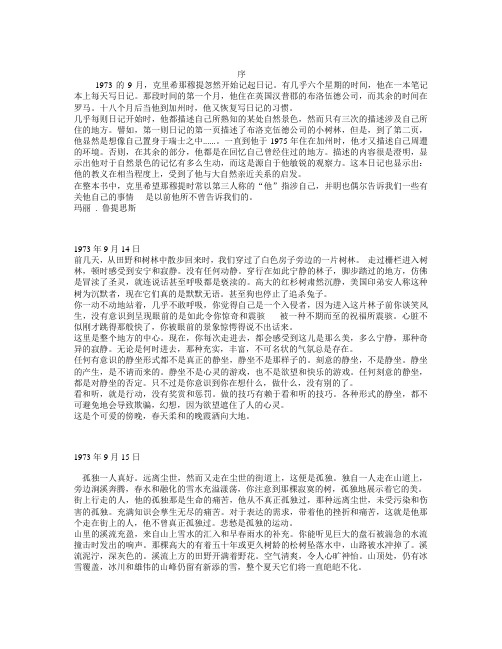
序1973的9月,克里希那穆提忽然开始记起日记。
有几乎六个星期的时间,他在一本笔记本上每天写日记。
那段时间的第一个月,他住在英国汉普郡的布洛伍德公司,而其余的时间在罗马。
十八个月后当他到加州时,他又恢复写日记的习惯。
几乎每则日记开始时,他都描述自己所熟知的某处自然景色,然而只有三次的描述涉及自己所住的地方。
譬如,第一则日记的第一页描述了布洛克伍德公司的小树林,但是,到了第二页,他显然是想像自己置身于瑞士之中......。
一直到他于1975年住在加州时,他才又描述自己周遭的环境。
否则,在其余的部分,他都是在回忆自己曾经住过的地方。
描述的内容很是澄明,显示出他对于自然景色的记忆有多么生动,而这是源自于他敏锐的观察力。
这本日记也显示出:他的教义在相当程度上,受到了他与大自然亲近关系的启发。
在整本书中,克里希望那穆提时常以第三人称的“他”指涉自己,并眀也偶尔告诉我们一些有关他自己的事情----是以前他所不曾告诉我们的。
玛丽. 鲁提思斯1973年9月14日前几天,从田野和树林中散步回来时,我们穿过了白色房子旁边的一片树林。
走过栅栏进入树林,顿时感受到安宁和寂静。
没有任何动静。
穿行在如此宁静的林子,脚步踏过的地方,仿佛是冒渎了圣灵,就连说话甚至呼吸都是亵渎的。
高大的红杉树肃然沉静,美国印弟安人称这种树为沉默者,现在它们真的是默默无语。
甚至狗也停止了追杀兔子。
你一动不动地站着,几乎不敢呼吸,你觉得自己是一个入侵者,因为进入这片林子前你谈笑风生,没有意识到呈现眼前的是如此令你惊奇和震骇-- 被一种不期而至的祝福所震骇。
心脏不似刚才跳得那般快了,你被眼前的景象惊愕得说不出话来。
这里是整个地方的中心。
现在,你每次走进去,都会感受到这儿是那么美,多么宁静,那种奇异的寂静。
无论是何时进去,那种充实,丰富,不可名状的气氛总是存在。
任何有意识的静坐形式都不是真正的静坐,静坐不是那样子的。
刻意的静坐,不是静坐。
静坐的产生,是不请而来的。
克里希那穆提的语录29条

克里希那穆提的语录29条2023年克里希那穆提的语录29条这种爱的缺乏就是你的孤独而当你看到这个真相你就再也不会试图用外在的人或事来填补了。
下面是关于克里希那穆提的语录29条,欢迎大家阅读。
1、当我们找到了另一种能够实现忘我境界的途径时,我们就可以不再依赖性。
等心念了解了它的全部过程,问题也就结束了。
也就是说,当对性的过度思考停止时,心智就自然会有创造了,而正是这种创造使我们感到快乐。
处在创造的状态中是一种快乐,因为那也是一种忘我。
2、外在的种种权威和伤害扭曲了心灵,而且年纪越大,这些扭曲会变得越厉害。
一个年轻人还没有对家庭、工作、所有活动和苦难许下承诺,这时候,胸怀大志的他就可以播下会开一辈子花的种子,而不是每天迷失在所有无意义且荒谬的追求中。
一个人不只应该觉察外在的事物,也应该觉察内心深处的欲望、追求、动机、恐惧、焦虑。
只有在冲突被完全终止时,不被扭曲的心灵才会出现。
3、感知需要摒弃所有的语言。
因为语言是思想,无法让头脑宁静,在宁静状态下开始的行动完全不同于语言所引发的行动,敏感的觉知让头脑摆脱了一切语言、意象和记忆。
如果我们把美丽和丑陋各自贴上“快乐的”和“痛苦的”两种标签,那并不意味着它们本身就是快乐的或痛苦的,语言将生活区分成了快乐和哀伤,这是一种分裂的活动,而全心全意地感知不是。
4、冥想是在专注的状态下进行的一种运动。
我们无法获得专注,是因为它不为个人所有。
如果我们觉察到思想的活动,专注会自然出现。
5、祈祷不是禅定,作为排斥的专心也不是禅定。
禅定是自我了解,没有自我了解,就没有禅定。
自知是禅定的开始。
6、如果我们时时刻刻都很警觉,能觉知一言一行以及所有发生的事,能察觉思想的活动,能觉知到自己如何说话、如何走路、如何反应、如何摆姿势等,那么所有深埋的东西就会很容易地暴露出来。
这不需要花什么时间,因为我们已经不再抗拒什么,也不再刻意挖掘什么,我们只是一直在观察与聆听。
处在觉知的状态里,所有东西都会暴露出来。
《教育就是解放心灵》--克里希那穆提
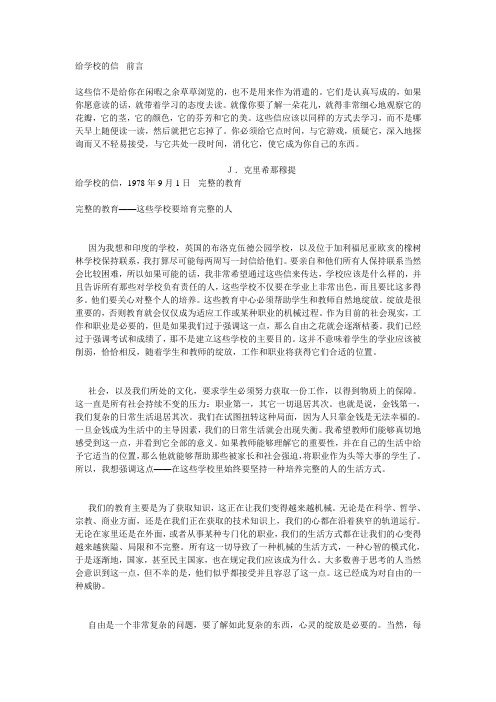
给学校的信 - 前言这些信不是给你在闲暇之余草草浏览的,也不是用来作为消遣的。
它们是认真写成的,如果你愿意读的话,就带着学习的态度去读。
就像你要了解一朵花儿,就得非常细心地观察它的花瓣,它的茎,它的颜色,它的芬芳和它的美。
这些信应该以同样的方式去学习,而不是哪天早上随便读一读,然后就把它忘掉了。
你必须给它点时间,与它游戏,质疑它,深入地探询而又不轻易接受,与它共处一段时间,消化它,使它成为你自己的东西。
J.克里希那穆提给学校的信,1978年9月1日 - 完整的教育完整的教育——这些学校要培育完整的人因为我想和印度的学校,英国的布洛克伍德公园学校,以及位于加利福尼亚欧亥的橡树林学校保持联系,我打算尽可能每两周写一封信给他们。
要亲自和他们所有人保持联系当然会比较困难,所以如果可能的话,我非常希望通过这些信来传达,学校应该是什么样的,并且告诉所有那些对学校负有责任的人,这些学校不仅要在学业上非常出色,而且要比这多得多。
他们要关心对整个人的培养。
这些教育中心必须帮助学生和教师自然地绽放。
绽放是很重要的,否则教育就会仅仅成为适应工作或某种职业的机械过程。
作为目前的社会现实,工作和职业是必要的,但是如果我们过于强调这一点,那么自由之花就会逐渐枯萎。
我们已经过于强调考试和成绩了,那不是建立这些学校的主要目的。
这并不意味着学生的学业应该被削弱,恰恰相反,随着学生和教师的绽放,工作和职业将获得它们合适的位置。
社会,以及我们所处的文化,要求学生必须努力获取一份工作,以得到物质上的保障。
这一直是所有社会持续不变的压力:职业第一,其它一切退居其次。
也就是说,金钱第一,我们复杂的日常生活退居其次。
我们在试图扭转这种局面,因为人只靠金钱是无法幸福的。
一旦金钱成为生活中的主导因素,我们的日常生活就会出现失衡。
我希望教师们能够真切地感受到这一点,并看到它全部的意义。
如果教师能够理解它的重要性,并在自己的生活中给予它适当的位置,那么他就能够帮助那些被家长和社会强迫,将职业作为头等大事的学生了。
克里希那穆提的故事 (1)

克里希那穆提的故事克里希那穆提的故事2010-11-21 12:14摘自《宁静的心灵》,1971年出版,作者John E.Coleman(本文作者John E.Coleman是一个28岁的西方青年,正在印度寻找宗教导师。
他没有听说过克里希那穆提,但是在飞机场偶然碰到了他。
这篇文章就是这次见面的故事。
)在印度我开始寻找各种宗教领袖、上师、瑜伽师、以及所谓开悟的人。
我在锡金拜访过西藏和尚,在加尔格达、李希克希、伯纳热斯、德里、马德拉斯、孟买拜访了印度教的导师与瑜伽师,在Bodtagaya拜访了佛教僧人(Bodtagaya相传为释迦牟尼开悟的地方)。
我访问了印度许多地方的宗教导师们,与他们谈话,讨论他们的各种身心控制方法,并亲身参与了一些列奇特的修炼活动。
我会在本书描述其中的一些。
但是我发现所有这些方法,最多就是通过重复某些字句、念诵、或者把意念守于某些中性的物体上,而产生某种暂时的,身心俱忘的状态。
许多这些试验给我带来了某种程度的平静。
但我仍然完全不能超越自己淘气与好奇的头脑的活动。
我觉得我知道自己失败的原因,就像前面解释过的一样。
但是我怎么才能够寻求光明而又不把自己全部的心理机能投入到寻求中去呢?怎么才能够看到真理,而又不有意地和全心地投入到对真理的追寻呢?这就像和我自己的影子捉迷藏一样。
在等待从伯纳热斯到新德里的飞机起飞时,我注意到一个印度人正在与一群朋友道别。
他的身影引人注目,年纪较大,大约接近七十岁了,高个,满头白发。
他身穿常见的那种简单的白色亚麻布衣服。
他的离去显然给他的朋友们带来了悲伤。
他们正在真诚地祝福他有一个安全的旅程,并希望他快点回来。
我心想他一定是个名人或者是什么重要贵宾。
我们一起走上了飞机的梯子。
我很快就坐了下来,埋头阅读一本机场书店里买的书,而忘记了周围的一切,除了注意到一个年轻漂亮的美国女人坐到了我旁边的座位上。
我没有再注意那个穿白衣服的男人,而且在此后的那段旅途上完全把他忘了。
克里希那穆提书阅读顺序
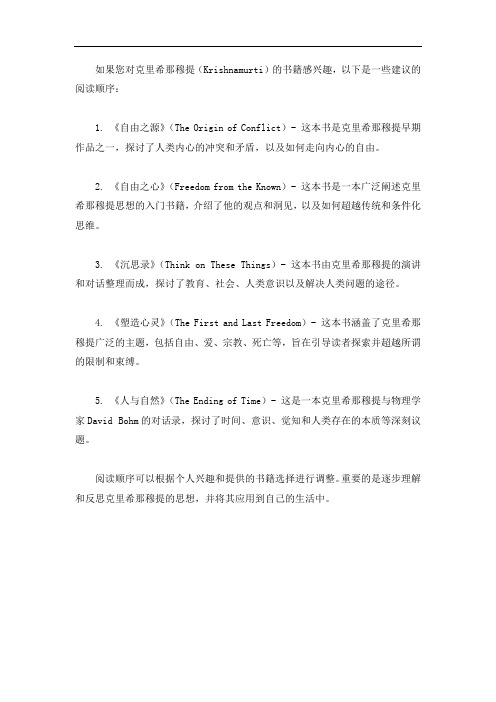
如果您对克里希那穆提(Krishnamurti)的书籍感兴趣,以下是一些建议的阅读顺序:
1. 《自由之源》(The Origin of Conflict)- 这本书是克里希那穆提早期作品之一,探讨了人类内心的冲突和矛盾,以及如何走向内心的自由。
2. 《自由之心》(Freedom from the Known)- 这本书是一本广泛阐述克里希那穆提思想的入门书籍,介绍了他的观点和洞见,以及如何超越传统和条件化思维。
3. 《沉思录》(Think on These Things)- 这本书由克里希那穆提的演讲和对话整理而成,探讨了教育、社会、人类意识以及解决人类问题的途径。
4. 《塑造心灵》(The First and Last Freedom)- 这本书涵盖了克里希那穆提广泛的主题,包括自由、爱、宗教、死亡等,旨在引导读者探索并超越所谓的限制和束缚。
5. 《人与自然》(The Ending of Time)- 这是一本克里希那穆提与物理学家David Bohm的对话录,探讨了时间、意识、觉知和人类存在的本质等深刻议题。
阅读顺序可以根据个人兴趣和提供的书籍选择进行调整。
重要的是逐步理解和反思克里希那穆提的思想,并将其应用到自己的生活中。
心的本质 克里希那穆提
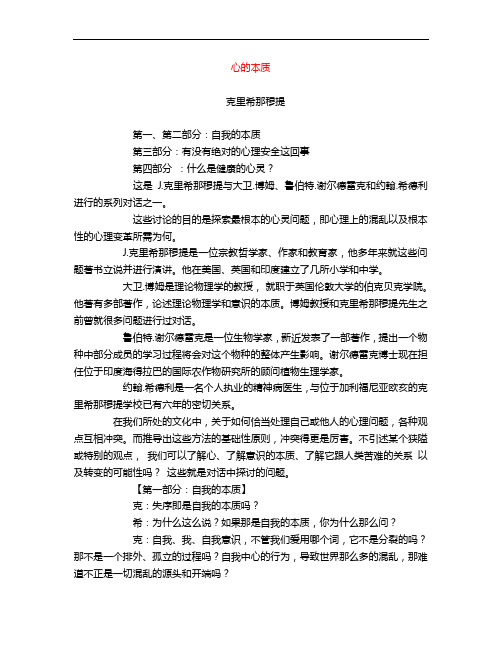
心的本质克里希那穆提第一、第二部分:自我的本质第三部分:有没有绝对的心理安全这回事第四部分:什么是健康的心灵?这是J.克里希那穆提与大卫.博姆、鲁伯特.谢尔德雷克和约翰.希德利进行的系列对话之一。
这些讨论的目的是探索最根本的心灵问题,即心理上的混乱以及根本性的心理变革所需为何。
J.克里希那穆提是一位宗教哲学家、作家和教育家,他多年来就这些问题著书立说并进行演讲。
他在美国、英国和印度建立了几所小学和中学。
大卫.博姆是理论物理学的教授,就职于英国伦敦大学的伯克贝克学院。
他著有多部著作,论述理论物理学和意识的本质。
博姆教授和克里希那穆提先生之前曾就很多问题进行过对话。
鲁伯特.谢尔德雷克是一位生物学家,新近发表了一部著作,提出一个物种中部分成员的学习过程将会对这个物种的整体产生影响。
谢尔德雷克博士现在担任位于印度海得拉巴的国际农作物研究所的顾问植物生理学家。
约翰.希德利是一名个人执业的精神病医生,与位于加利福尼亚欧亥的克里希那穆提学校已有六年的密切关系。
在我们所处的文化中,关于如何恰当处理自己或他人的心理问题,各种观点互相冲突。
而推导出这些方法的基础性原则,冲突得更是厉害。
不引述某个狭隘或特别的观点,我们可以了解心、了解意识的本质、了解它跟人类苦难的关系以及转变的可能性吗?这些就是对话中探讨的问题。
【第一部分:自我的本质】克:失序即是自我的本质吗?希:为什么这么说?如果那是自我的本质,你为什么那么问?克:自我、我、自我意识,不管我们爱用哪个词,它不是分裂的吗?那不是一个排外、孤立的过程吗?自我中心的行为,导致世界那么多的混乱,那难道不正是一切混乱的源头和开端吗?希:根源就是自私的行为。
克:是的,生活各个层面的自我中心行为。
希:没错,而且情况无疑正是如此,一个病人进来,他关心的是他的忧伤。
克:是的。
希:或是他的恐惧。
克:他的成功、他的欢乐、他的痛苦、他的愤怒等等,这都是自我中心。
希:没错。
克:所以,可以的话,我要问自我难道不是一切混乱的源头吗?自我——我指的是自我中心的生活态度,个体感,强调个体,强调他的拯救、他的成就、他的快乐、他的焦虑等等等等。
克里希那穆提《论生活》
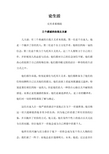
论生活克里希那穆提三个虔诚的自我主义者几天前,有三个虔诚的自我主义者来找我。
第一位是个出家人,他是一个抛弃了俗世的人;第二位是个东方文化学者,他相信四海一家的信念;第三位是个致力于乌托邦主义的人。
这三个人都努力于自己的工作,并轻视别人的态度与活动,他们都对自己的信念深信不疑。
他们都热心的依附于自己的特殊信仰,他们都冷酷无情的活在一种奇特的生活方式之中。
他们都告诉我,特别是那位乌托邦主义者,他们都准备为了他们的信仰而牺牲自己以及他们的朋友。
他们表面上看起来既谦逊又温和,特别是那位相信四海一家的人,但是他们给人一种铁石心肠以及不耐烦的感觉,而那正是优越感的象征。
他们是被选择的人、是上帝的翻译者;他们对一切的事情都很了解与确定。
这位出家人在一场严肃的谈话中说他正在为下一世做准备。
他宣称这一世只能够提供他非常少的东西,因为他已经看透了所有世俗的幻象,并且抛弃了世俗的方式。
他又说,他有某些个性上的弱点以及无法专注的问题,但在他的下一世他会成为自己理想中的那个人。
他所有的兴趣与活力都在于他下一世将会成为某个伟大人物的信念。
我们谈了一阵子,而他总是在强调明天、未来。
他说,过去是存在的,但总是与未来息息相关;现在仅仅是通往未来的通道,今天之所以有趣只是因为有明天。
他问我,如果没有明天,那为什么要努力呢?一个人也许只要浑浑噩噩或者像只温驯的母牛般的过日子就好了。
他说,人生就是从过去通过暂时的现在到达未来的持续移动。
我们应该使用现在,以便于在未来成为某种样子:成为有智慧的、强壮的、慈悲的。
现在与未来都是瞬息即逝的,但是在明天果实将会成熟。
他坚持今天只不过是一种垫脚石,我们不必太担心它;我们要弄清楚明天的理想并且让这段旅程成功。
总之,他对现在很不耐烦。
那位相信四海一家的人更有学问,他的语言更有诗意;他是个操纵文字的行家,既温文儒雅又有说服力。
他也为自己在未来雕刻了一座神龛。
他要成为伟大人物。
他的心中充满了这种想法,他已经为了那个未来收了一些弟子。
克里希那穆提的教育思想探析
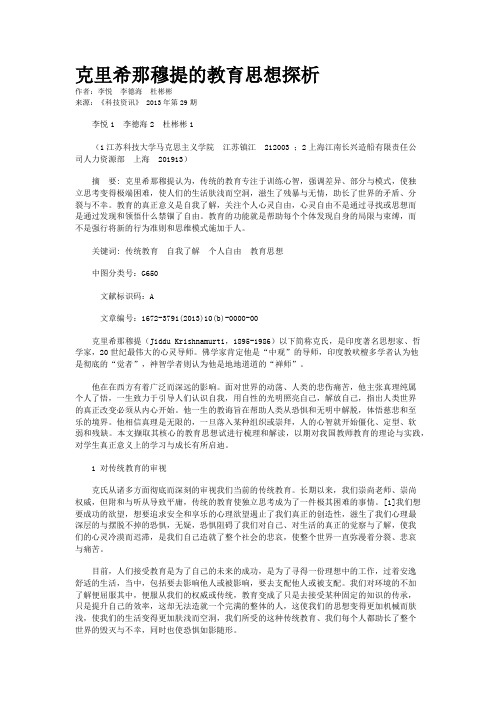
克里希那穆提的教育思想探析作者:李悦李德海杜彬彬来源:《科技资讯》 2013年第29期李悦1 李德海2 杜彬彬1(1江苏科技大学马克思主义学院江苏镇江 212003 ;2上海江南长兴造船有限责任公司人力资源部上海 201913)摘要: 克里希那穆提认为,传统的教育专注于训练心智,强调差异、部分与模式,使独立思考变得极端困难,使人们的生活肤浅而空洞,滋生了残暴与无情,助长了世界的矛盾、分裂与不幸。
教育的真正意义是自我了解,关注个人心灵自由,心灵自由不是通过寻找或思想而是通过发现和领悟什么禁锢了自由。
教育的功能就是帮助每个个体发现自身的局限与束缚,而不是强行将新的行为准则和思维模式施加于人。
关键词: 传统教育自我了解个人自由教育思想中图分类号:G650文献标识码:A文章编号:1672-3791(2013)10(b)-0000-00克里希那穆提(Jiddu Krishnamurti,1895-1986)以下简称克氏,是印度著名思想家、哲学家,20世纪最伟大的心灵导师。
佛学家肯定他是“中观”的导师,印度教吠檀多学者认为他是彻底的“觉者”,神智学者则认为他是地地道道的“禅师”。
他在在西方有着广泛而深远的影响。
面对世界的动荡、人类的悲伤痛苦,他主张真理纯属个人了悟,一生致力于引导人们认识自我,用自性的光明照亮自己,解放自己,指出人类世界的真正改变必须从内心开始。
他一生的教诲旨在帮助人类从恐惧和无明中解脱,体悟慈悲和至乐的境界。
他相信真理是无限的,一旦落入某种组织或崇拜,人的心智就开始僵化、定型、软弱和残缺。
本文撷取其核心的教育思想试进行梳理和解读,以期对我国教师教育的理论与实践,对学生真正意义上的学习与成长有所启迪。
1 对传统教育的审视克氏从诸多方面彻底而深刻的审视我们当前的传统教育。
长期以来,我们崇尚老师、崇尚权威,但附和与听从导致平庸,传统的教育使独立思考成为了一件极其困难的事情。
[1]我们想要成功的欲望,想要追求安全和享乐的心理欲望遏止了我们真正的创造性,滋生了我们心理最深层的与摆脱不掉的恐惧,无疑,恐惧阻碍了我们对自己、对生活的真正的觉察与了解,使我们的心灵冷漠而迟滞,是我们自己造就了整个社会的悲哀,使整个世界一直弥漫着分裂、悲哀与痛苦。
《人的脑子能不能恢复原来的清新污染》克里希那穆提
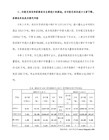
任何方法或例行公事,不论合逻辑或不合逻辑,只要它重复再三地陷在某个狭小的范围之内,就“必定”影响到脑子。如果它不停止,脑子又该如何更新自己呢?
(五)
心理分析局限在时间的模式里
不论是弗洛伊德、荣格、最前卫的心理学家或精神科医师,他们其实都在促成脑子的萎缩。不是要省略这些知识,而是要认清它的运作方式和徒劳无益。你一旦认清之后,就自然会抛弃所有的心理分析。这种治疗模式不仅现在盛行,一百万年以来人类都透过分析、内省及自我要求来治疗自己。我个人从来不采用这些方法,因此我把这些方法都否决了。
意识的空寂中有无限的能量
内心所有东西都空了。这种空寂之中就是无限的能量。脑子里错综复杂的连结消失以后,就会释放极大的能量。
(八)
真正的冥想就是使意识变空
我们一路下来的讨论就是真正的冥想,但是一般人并不认为这就是冥想。
真正的冥想就是使意识变空。
冥想是具有穿透力的活动。它没有过去。
不加思索的例行公事会逐渐使人变得迟钝。相反的,一个人如果能不断地思考,就能阻止脑部的萎缩。
从某一个年龄开始,脑子便逐渐萎缩,如同身体的肌肉一般,如果久不用它,就会逐渐失去弹性。因此,脑部的运动十分重要!
脑子陷入僵化的模式或机械的例行公事就会走向萎缩
脑子只要陷入任何模式或例行公事,一定会逐渐萎缩。因为重复再三的活动大多是机械化的。因此无法用到脑子的所有潜力。
那些经年累月枯坐冥想的人,可能是世上最乏味的人了,其他譬如律师或教授之类的人,也有同样的特质。固定在某个狭窄范围之内的理性思考,也会变成僵化的模式。
如果一个人经常锻炼身体,它确实会变得非常强壮,但也可能变得机械化。因此也会造成不良影响。
(一)
人类的脑子一直在退化
克里希那穆提经典语录备课讲稿
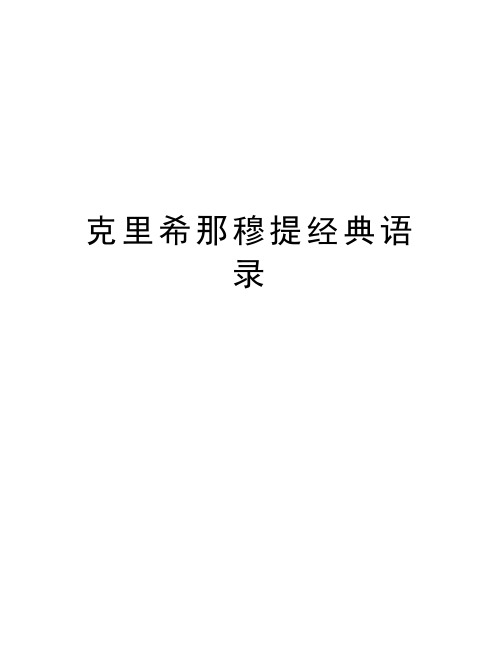
克里希那穆提经典语录克里希那穆提经典语录吉杜·克里希那穆提是近代第一位用通俗的语言,向西方全面深入阐述东方哲学智慧的印度哲人。
在二十世纪一度对西方哲学宗教产生过重大的影响,随着互联网信息的革命,其思想近年来才被中国大陆知识分子慢慢熟知,影响力也逐步慢慢扩大。
他的一生颇具传奇色彩。
被印度的佛教徒肯定为“中观”与“禅”的导师,而印度教徒则承认他是彻悟的觉者。
失去这个人之后所感受到的寂寞、苍凉、痛苦,在你还没恋爱以前就存在了。
你所谓的爱只是一种刺激,暂时掩盖你的空虚。
你通过另一个人来逃避寂寞,利用这个人掩盖寂寞。
你的问题不在于这段关系,而是你自己的空虚。
逃避是很危险的,因为它就像某种药,把真正的问题隐藏起来。
这是因为你心中没有爱,所以不断从外在寻找爱来填补自己。
这种缺乏爱的表现导致你寂寞,等你看清楚这个事实,你就不会再靠外来的人事物来填补内心的空虚。
《与爱同在》自由是独立,不依附,不恐惧。
《与生活相遇》你改变不了一座山的轮廓,改变不了一只鸟的飞翔轨迹,改变不了河水流淌的速度,所以只是观察它,发现它的美就够了。
《关系的真谛》我们总想在别人那里得到启蒙,而无法靠自己去觉察和理解。
如果某个开悟的人能满足我们的需求,我们就接受他。
...... 因此,大部分人所渴望的只是不同层次的满足罢了。
须知,没有任何一个权威能够让你认识自己,缺乏自我认识,你是不可能解除无明和痛苦的。
《生命之书》“有依赖,就不可能有爱。
”灵魂只能独行,因为我们都有能力决定自己的方向,却没有能力控制别人的道路。
如果偏要把别人拉到你的生活轨迹上,或者你又要强行的进入别人的世界,最终的结果无非只有两种,要么在自己的世界里等死,要么在别人的世界里被扯到四分五裂。
《爱与寂寞》太多的声音,总会在你不思索什么,不分辨什么的时候才听得到。
人的本能,在很多的时候屏蔽掉很多你大脑不愿意听到的声音。
身体如此,我们在人世上也如此。
同样的,太多的美丽,总是在你不在意自己的境况时才被发现。
克里希那穆提

这位慈悲与智慧化身的人类导师,穷其一生带领人们进入他所达到的境界,直到九十岁去世前都还在不停奔 波。
人物轶事
克氏童年时对学校的功课没有多大兴趣,他爱梦想,虽然时常看似迷糊而实则具有惊人的剖析力。由于体弱 多病,克氏几乎每天都在发高烧。不能上学读书的日子里,他就待在家里拆东西,自己研究时钟或其他机器的结 构。学校里的老师完全无法理解这个孩子,都认为他智能不足,常毒打他、罚他站,但这丝毫没有影响到他。不 管赞美或批评,他毫不在乎,没有任何人的思想和观念曾左右或影响过他。他曾这么形容自己:“就像有许多洞 的容器,什么东西进去,什么东西就出来,没有任何东西留下。”
基督·克里希那穆提(Jiddu Krishnamurti),(1895年5月12日-1986年2月16日)。 十三岁时由“通 神学会”(Theosophical Society)领养。
(克里希那穆提)《人生中不可不想的事》
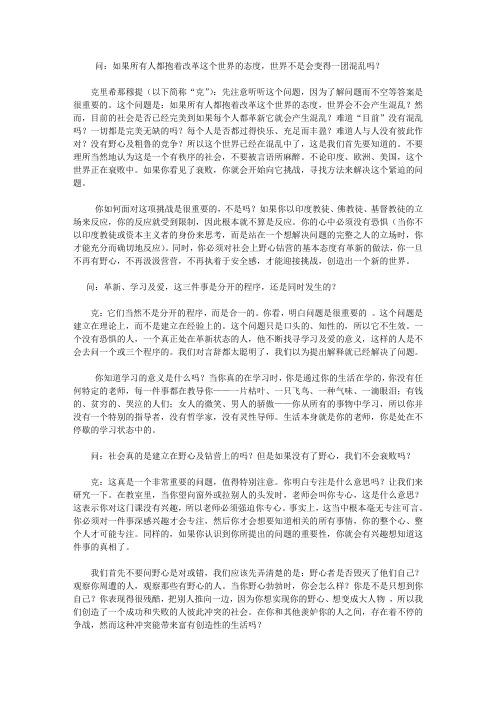
问:如果所有人都抱着改革这个世界的态度,世界不是会变得一团混乱吗?克里希那穆提(以下简称“克”):先注意听听这个问题,因为了解问题而不空等答案是很重要的。
这个问题是:如果所有人都抱着改革这个世界的态度,世界会不会产生混乱?然而,目前的社会是否已经完美到如果每个人都革新它就会产生混乱?难道“目前”没有混乱吗?一切都是完美无缺的吗?每个人是否都过得快乐、充足而丰盈?难道人与人没有彼此作对?没有野心及粗鲁的竞争?所以这个世界已经在混乱中了,这是我们首先要知道的。
不要理所当然地认为这是一个有秩序的社会,不要被言语所麻醉。
不论印度、欧洲、美国,这个世界正在衰败中。
如果你看见了衰败,你就会开始向它挑战,寻找方法来解决这个紧迫的问题。
你如何面对这项挑战是很重要的,不是吗?如果你以印度教徒、佛教徒、基督教徒的立场来反应,你的反应就受到限制,因此根本就不算是反应。
你的心中必须没有恐惧(当你不以印度教徒或资本主义者的身份来思考,而是站在一个想解决问题的完整之人的立场时,你才能充分而确切地反应)。
同时,你必须对社会上野心钻营的基本态度有革新的做法,你一旦不再有野心,不再汲汲营营,不再执着于安全感,才能迎接挑战,创造出一个新的世界。
问:革新、学习及爱,这三件事是分开的程序,还是同时发生的?克:它们当然不是分开的程序,而是合一的。
你看,明白问题是很重要的。
这个问题是建立在理论上,而不是建立在经验上的。
这个问题只是口头的、知性的,所以它不生效。
一个没有恐惧的人,一个真正处在革新状态的人,他不断找寻学习及爱的意义,这样的人是不会去问一个或三个程序的。
我们对言辞都太聪明了,我们以为提出解释就已经解决了问题。
你知道学习的意义是什么吗?当你真的在学习时,你是通过你的生活在学的,你没有任何特定的老师,每一件事都在教导你——一片枯叶、一只飞鸟、一种气味、一滴眼泪;有钱的、贫穷的、哭泣的人们;女人的微笑、男人的骄傲——你从所有的事物中学习,所以你并没有一个特别的指导者,没有哲学家,没有灵性导师。
- 1、下载文档前请自行甄别文档内容的完整性,平台不提供额外的编辑、内容补充、找答案等附加服务。
- 2、"仅部分预览"的文档,不可在线预览部分如存在完整性等问题,可反馈申请退款(可完整预览的文档不适用该条件!)。
- 3、如文档侵犯您的权益,请联系客服反馈,我们会尽快为您处理(人工客服工作时间:9:00-18:30)。
ON LOVETHE DEMAND TO be safe in relationship inevitably breeds sorrow and fear. This seeking for security is inviting insecurity. Have you ever found security in any of your relationships? Have you? Most of us want the security of loving and being loved, but is there love when each one of us is seeking his own security, his own particular path? We are not loved because we don't know how to love.What is love? The word is so loaded and corrupted that I hardly like to use it. Everybody talks of love - every magazine and newspaper and every missionary talks everlastingly of love. I love my country, I love my king, I love some book, I love that mountain, I love pleasure, I love my wife, I love God. Is love an idea? If it is, it can be cultivated, nourished, cherished, pushed around, twisted in any way you like. When you say you love God what does it mean? It means that you love a projection of your own imagination, a projection of yourself clothed in certain forms of respectability according to what you think is noble and holy; so to say, `I love God', is absolute nonsense. When you worship God you are worshipping yourself - and that is not love.Because we cannot solve this human thing called love we run away into abstractions. Love may be the ultimate solution to all man's difficulties, problems and travails, so how are we going to find out what love is? By merely defining it? The church has defined it one way, society another, and there are all sorts of deviations and perversions. Adoring someone, sleeping with someone, the emotional exchange, the companionship - is thatwhat we mean by love? That has been the norm, the pattern, and it has become so tremendously personal, sensuous, and limited that religions have declared that love is something much more than this. In what they call human love they see there is pleasure, competition, jealousy, the desire to possess, to hold, to control and to interfere with another's thinking, and knowing the complexity of all this they say there must be another kind of love, divine, beautiful, untouched, uncorrupted.Throughout the world, so-called holy men have maintained that to look at a woman is something totally wrong: they say you cannot come near to God if you indulge in sex, therefore they push it aside although they are eaten up with it. But by denying sexuality they put out their eyes and cut out their tongues for they deny the whole beauty of the earth. They have starved their hearts and minds; they are dehydrated human beings; they have banished beauty because beauty is associated with woman.Can love be divided into the sacred and the profane, the human and the divine, or is there only love? Is love of the one and not of the many? If I say,`I love you', does that exclude the love of the other? Is love personal or impersonal? Moral or immoral? Family or non-family? If you love mankind can you love the particular? Is love sentiment? Is love emotion? Is love pleasure and desire? All these questions indicate, don't they, that we have ideas about love, ideas about what it should or should not be, a pattern or a code developed by the culture in which we live.So to go into the question of what love is we must first ideals and ideologies of what it should or should not be. To divide anything into what should be and what is, is the most deceptiveway of dealing with life.Now how am I going to find out what this flame is which we call love - not how to express it to another but what it means in itself? I will first reject what the church, what society, what my parents and friends, what every person and every book has said about it because I want to find out for myself what it is. Here is an enormous problem that involves the whole of mankind, there have been a thousand ways of defining it and I myself am caught in some pattern or other according to what I like or enjoy at the moment - so shouldn't I, in order to understand it, first free myself from my own inclinations and prejudices? I am confused, torn by my own desires, so I say to myself, `First clear up your own confusion. Perhaps you may be able to discover what love is through what it is not.'The government says, `Go and kill for the love of your country'. Is that love? Religion says, `Give up sex for the love of God'. Is that love? Is love desire? Don't say no. For most of us it is - desire with pleasure, the pleasure that is derived through the senses, through sexual attachment and fulfilment. I am not against sex, but see what is involved in it. What sex gives you momentarily is the total abandonment of yourself, then you are back again with your turmoil, so you want a repetition over and over again of that state in which there is no worry, no problem, no self. You say you love your wife. In that love is involved sexual pleasure, the pleasure of having someone in the house to look after your children, to cook. You depend on her; she has given you her body, her emotions, her encouragement, a certain feeling of security and well-being. Then she turns away from you; she gets bored or goes off with someoneelse, and your whole emotional balance is destroyed, and this disturbance, which you don't like, is called jealousy. There is pain in it, anxiety, hate and violence. So what you are really saying is, `As long as you belong to me I love you but the moment you don't I begin to hate you. As long as I can rely on you to satisfy my demands, sexual and otherwise, I love you, but the moment you cease to supply what I want I don't like you.' So there is antagonism between you, there is separation, and when you feel separate from another there is no love. But if you can live with your wife without thought creating all these contradictory states, these endless quarrels in yourself, then perhaps - perhaps - you will know what love is. Then you are completely free and so is she, whereas if you depend on her for all your pleasure you are a slave to her. So when one loves there must be freedom, not only from the other person but from oneself.This belonging to another, being psychologically nourished by another, depending on another - in all this there must always be anxiety, fear, jealousy, guilt, and so long as there is fear there is no love; a mind ridden with sorrow will never know what love is; sentimentality and emotionalism have nothing whatsoever to do with love. And so love is not to do with pleasure and desire.Love is not the product of thought which is the past. Thought cannot possibly cultivate love. Love is not hedged about and caught in jealousy, for jealousy is of the past. Love is always active present. It is not `I will love' or `I have loved'. If you know love you will not follow anybody. Love does not obey. When you love there is neither respect nor disrespect.Don't you know what it means really to love somebody - to lovewithout hate, without jealousy, without anger, without wanting to interfere with what he is doing or thinking, without condemning, without comparing - don't you know what it means? Where there is love is there comparison? When you love someone with all your heart, with all your mind, with all your body, with your entire being, is there comparison? When you totally abandon yourself to that love there is not the other.Does love have responsibility and duty, and will it use those words? When you do something out of duty is there any love in it? In duty there is no love. The structure of duty in which the human being is caught is destroying him. So long as you are compelled to do something because it is your duty you don't love what you are doing. When there is love there is no duty and no responsibility. Most parents unfortunately think they are responsible for their children and their sense of responsibility takes the form of telling them what they should do and what they should not do, what they should become and what they should not become. The parents want their children to have a secure position in society. What they call responsibility is part of that respectability they worship; and it seems to me that where there is respectability there is no order; they are concerned only with becoming a perfect bourgeois. When they prepare their children to fit into society they are perpetuating war, conflict and brutality. Do you call that care and love?Really to care is to care as you would for a tree or a plant, watering it, studying its needs, the best soil for it, looking after it with gentleness and tenderness - but when you prepare your children to fit into society you are preparing them to be killed. If you loved your children you would have no war.When you lose someone you love you shed tears - are your tears for yourself or for the one who is dead? Are you crying for yourself or for another? Have you ever cried for another? Have you ever cried for your son who is killed on the battlefield? You have cried, but do those tears come out of self-pity or have you cried because a human being has been killed? If you cry out of self-pity your tears have no meaning because you are concerned about yourself. If you are crying because you are bereft of one in whom you have invested a great deal of affection, it was not really affection. When you cry for your brother who dies cry for him. It is very easy to cry for yourself because he is gone. Apparently you are crying because your heart is touched, but it is not touched for him, it is only touched by self-pity and self-pity makes you hard, encloses you, makes you dull and stupid.When you cry for yourself, is it love - crying because you are lonely, because you have been left, because you are no longer powerful - complaining of your lot, your environment - always you in tears? If you understand this, which means to come in contact with it as directly as you would touch a tree or a pillar or a hand, then you will see that sorrow is self-created, sorrow is created by thought, sorrow is the outcome of time. I had my brother three years ago, now he is dead, now I am lonely, aching, there is no one to whom I can look for comfort or companionship, and it brings tears to my eyes.You can see all this happening inside yourself if you watch it. You can see it fully, completely, in one glance, not take analytical time over it. You can see in a moment the whole structure and nature of this shoddy little thing called `me', my tears, my family,my nation, my belief, my religion - all that ugliness, it is all inside you. When you see it with your heart, not with your mind, when you see it from the very bottom of your heart, then you have the key that will end sorrow. Sorrow and love cannot go together, but in the Christian world they have idealized suffering, put it on a cross and worshipped it, implying that you can never escape from suffering except through that one particular door, and this is the whole structure of an exploiting religious society.So when you ask what love is, you may be too frightened to see the answer. It may mean complete upheaval; it may break up the family; you may discover that you do not love your wife or husband or children - do you? - you may have to shatter the house you have built, you may never go back to the temple.But if you still want to find out, you will see that fear is not love, dependence is not love, jealousy is not love, possessiveness and domination are not love, responsibility and duty are not love, self-pity is not love, the agony of not being loved is not love, love is not the opposite of hate any more than humility is the opposite of vanity. So if you can eliminate all these, not by forcing them but by washing them away as the rain washes the dust of many days from a leaf, then perhaps you will come upon this strange flower which man always hungers after.If you have not got love - not just in little drops but in abundance - if you are not filled with it - the world will go to disaster. You know intellectually that the unity of mankind is essential and that love is the only way, but who is going to teach you how to love? Will any authority, any method, any system, tell you how to love? If anyone tells you, it is not love. Can you say, `Iwill practise love. I will sit down day after day and think about it. I will practise being kind and gentle and force myself to pay attention to others?' Do you mean to say that you can discipline yourself to love, exercise the will to love? When you exercise discipline and will to love, love goes out of the window. By practising some method or system of loving you may become extraordinarily clever or more kindly or get into a state of non-violence, but that has nothing whatsoever to do with love.In this torn desert world there is no love because pleasure and desire play the greatest roles, yet without love your daily life has no meaning. And you cannot have love if there is no beauty. Beauty is not something you see - not a beautiful tree, a beautiful picture, a beautiful building or a beautiful woman. There is beauty only when your heart and mind know what love is. Without love and that sense of beauty there is no virtue, and you know very well that, do what you will, improve society, feed the poor, you will only be creating more mischief, for without love there is only ugliness and poverty in your own heart and mind. But when there is love and beauty, whatever you do is right, whatever you do is in order. If you know how to love, then you can do what you like because it will solve all other problems.So we reach the point: can the mind come upon love without discipline, without thought, without enforcement, without any book, any teacher or leader - come upon it as one comes upon a lovely sunset?It seems to me that one thing is absolutely necessary and that is passion without motive - passion that is not the result of some commitment or attachment, passion that is not lust. A man whodoes not know what passion is will never know love because love can come into being only when there is total self-abandonment.A mind that is seeking is not a passionate mind and to come upon love without seeking it is the only way to find it - to come upon it unknowingly and not as the result of any effort or experience. Such a love, you will find, is not of time; such a love is both personal and impersonal, is both the one and the many. Like a flower that has perfume you can smell it or pass it by. That flower is for everybody and for the one who takes trouble to breathe it deeply and look at it with delight. Whether one is very near in the garden, or very far away, it is the same to the flower because it is full of that perfume and therefore it is sharing with everybody.Love is something that is new, fresh, alive. It has no yesterday and no tomorrow. It is beyond the turmoil of thought. It is only the innocent mind which knows what love is, and the innocent mind can live in the world which is not innocent. To find this extraordinary thing which man has sought endlessly through sacrifice, through worship, through relationship, through sex, through every form of pleasure and pain, is only possible when thought comes to understand itself and comes naturally to an end. Then love has no opposite, then love has no conflict.You may ask, `If I find such a love, what happens to my wife, my children, my family? They must have security.' When you put such a question you have never been outside the field of thought, the field of consciousness. When once you have been outside that field you will never ask such a question because then you will know what love is in which there is no thought and therefore no time. You may read this mesmerized and enchanted, but actually togo beyond thought and time - which means going beyond sorrow - is to be aware that there is a different dimension called love.But you don't know how to come to this extraordinary fount - so what do you do? If you don't know what to do, you do nothing, don't you? Absolutely nothing. Then inwardly you are completely silent. Do you understand what that means? It means that you are not seeking, not wanting, not pursuing; there is no centre at all. Then there is love.。
